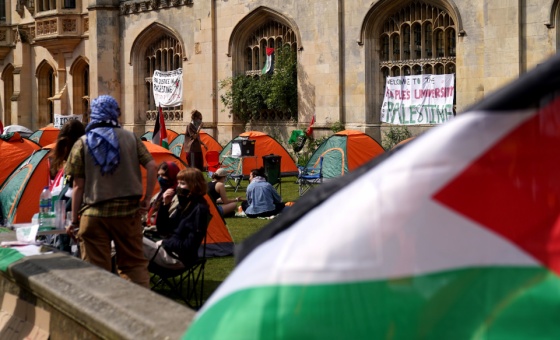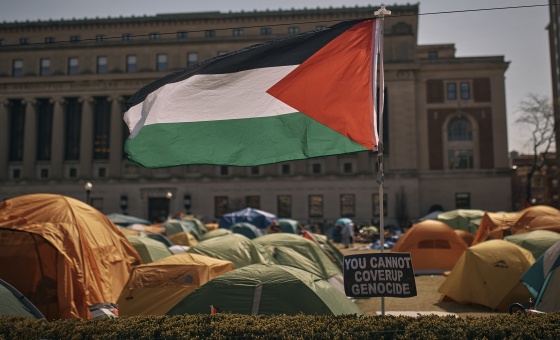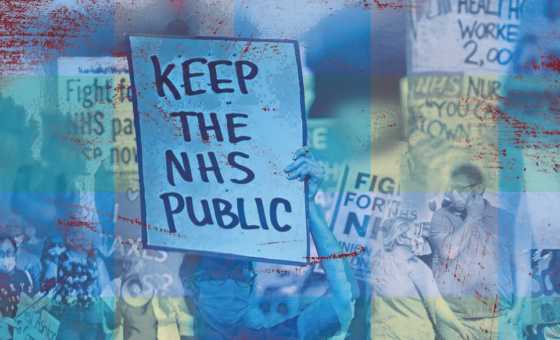This is the last article you can read this month
You can read more article this month
You can read more articles this month
Sorry your limit is up for this month
Reset on:
Please help support the Morning Star by subscribing here
TODAY we commemorate Hiroshima Day, August 6, 1945, when an atomic bomb was dropped on the Japanese city. Then, on August 9 another atomic bomb was dropped on the city of Nagasaki.
We have a duty to remember the victims of the bombing, and to campaign for world peace and nuclear disarmament, creating much-needed awareness about the danger nuclear weapons pose to the very future of humanity.
These two atomic bombs dropped on Japan, although much less deadly than those carried by the nuclear states today, killed and maimed hundreds of thousands of people, an estimated 140,000 people in Hiroshima and 74,000 in Nagasaki by the end of 1945. Tens of thousands more died in succeeding years.
The extent of the carnage in Hiroshima and Nagasaki made it nearly impossible to provide aid — a warning we must heed about what the disastrous effects of any nuclear attack or conflict would be today.
In Hiroshima alone, 90 per cent of nurses and doctors were killed or injured; 42 of 45 hospitals became non-functional and 70 per cent of surviving victims had combined injuries including, in most cases, severe burns.
The effects of these nuclear weapons are still being felt today — many of those who survived the atomic attacks have suffered from leukaemia, cancer, or other terrible side effects from the radiation in the years and decades that have followed.
Sadly, our rulers today have chosen not to learn any of these tragic lessons – instead, our government has decided to increase the number of nuclear warheads in its arsenal, for the first time since the cold war, by over 40 per cent.
We will have 260 warheads; each 10 times deadlier than Hiroshima.
They have done this despite the UK being a signatory to the UN’s Nuclear Non-Proliferation Treaty (NPT), which requires that we should be working towards disarmament, and are committed under international law to “pursue negotiations in good faith on effective measures relating to cessation of the nuclear arms race at an early date and to nuclear disarmament” (Article VI).
It also comes at a time when even Presidents Joe Biden and Vladimir Putin have just renewed their bilateral nuclear reductions treaty.
If expanding our nuclear arsenal – thus prompting a new global nuclear arms race – wasn’t bad enough, Boris Johnson’s government has also deemed now the time to widen the circumstances in which British nuclear weapons could be used.
It also goes against what many other governments internationally are doing. In particular, the Treaty on the Prohibition of Nuclear Weapons (TPNW or Global Nuclear Ban Treaty) has now been ratified by the required 50 states – 55 at the time of writing –meaning it enters into force.
The treaty makes it illegal under international law to develop, test, produce, manufacture, acquire, possess, stockpile, transfer, use or threaten to use nuclear weapons.
The fact that the government is committed to expanding nuclear weapons during the pandemic also shows the wrong priorities in terms of our security and spending.
It can’t both be true that there is no money for nurses to get a decent pay rise or to keep the £20 uplift of universal credit but there is at least £205 billion to spend just on renewing Trident.
And real security will come from international co-operation to tackle the major global challenges of our time, including the ongoing Covid pandemic, the ever-deepening climate emergency, the refugee crisis and the obscene levels of poverty and inequality.
Even the government’s own National Security Strategy identifies the main security threats today as terrorism, cyber-attacks and the consequences of climate change.
Nuclear weapons cannot deal with any of these.
Setsuko Thurlow, survivor of the 1945 atomic bombing of Hiroshima, during the acceptance speech of a Nobel Peace Prize in December 2017 – awarded to the International Campaign to Abolish Nuclear Weapons (ICAN) – said that “each person had a name. Each person was loved by someone. Let us ensure that their deaths were not in vain.”
Remembering Hiroshima and Nagasaki this week, we must be absolutely clear that those deaths were not in vain, and move forward across the labour, peace and progressive movements in arguing that that now is the time to make the case for nuclear disarmament.
As part of our campaigning, the Peace and Justice Project hosted two important international conferences recently.
At the first, thousands around the world heard the voices of refugees from desperate camps and from isolation. Their plea was for safe routes to safety and addressing the cause of their plight.
The second conference was on the arms trade: its corruption, brutality and human cost as bombs rain down on people in Yemen, Gaza and so many other places.
As discussed at these events, a huge effort is needed to create a more peaceful world, we have much to do. That means stepping up our support for the work CND is doing, including in terms of reporting the UK government to the UN and upcoming NPT Review Conference for breaking international law in launching a new nuclear arms race, and in lobbying for the UK to sign the Global Nuclear Ban Treaty.
And most of all it means arguing for a world of peace, forever free from the fear of nuclear annihilation.
For more information on the Peace and Justice Project visit https://thecorbynproject.com/
For more information on CND visit https://cnduk.org/
Jeremy Corbyn is MP for Islington North












